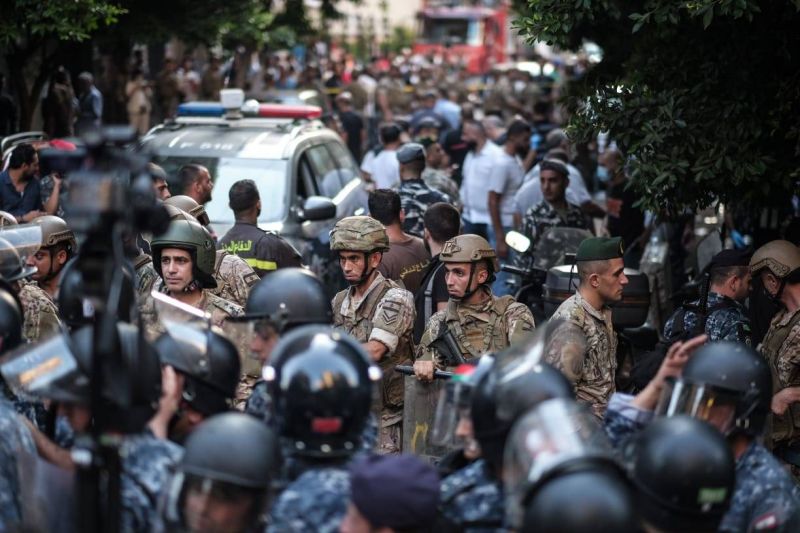
A group of Army and security forces outside Hamra's Federal Bank Thursday, when an armed man demanded for access to his funds. (Credit: João Sousa/L'Orient Today)
Want to get the Morning Brief by email? Click here to sign up.
A depositor turned himself in to security forces after holding hostages and attempting to forcibly withdraw his funds from the Federal Bank in Hamra — to pay for medical expenses, according to the Depositors Union. The situation was defused after a six-hour standoff when an agreement was reached, granting the gunman between $30,000 and $35,000. A crowd gathered outside the bank after calls for protest from civil society groups, namely the Depositors Union and the National Federation of Workers' and Employees' Trade Unions (FENASOL), which issued statements proclaiming solidarity with the hostage taker. According to Lebanese Army reports, the outraged depositor doused the inside of the bank in gasoline, recalling a similar incident in January when a man who was refused access to his savings threatened to burn a Bekaa branch of the Bank of Beirut and the Arab Countries (BBAC). Banks have imposed informal capital control measures since the beginning of the economic crisis in 2019, severely restricting depositors’ access to their funds – occasionally resulting in retaliatory, and sometimes violent, outbursts. On Monday, the Association of Banks in Lebanon held a one-day strike to protest “populist, harmful stances” against the sector. Imposing official capital control measures aims to “protect depositors’ funds,” deputy Parliament Speaker Elias Bou Saab said yesterday, according to the state-run National News Agency, in response to a query on the fulfillment of conditions for unlocking an International Monetary Fund aid package. “The Finance and Budget Committee is waiting for the Minister of Finance and the government to send them a decision to set the exchange rate, because the entire (2022) budget will be based on this decision,” Bou Saab added. The committee meanwhile approved further sections of the draft budget, another IMF requirement, and set a meeting for next week, chair Ibrahim Kanaan wrote on Twitter.
Vote buying, inequality in media coverage, violence and abuse of power by local authorities and parties were among the violations flagged by the Lebanese Association for Democratic Elections in their report on the May 2022 parliamentary elections. LADE criticized the absence of a capable independent supervisory body for the elections and the delineation of voting districts that “benefit sectarian leaders,” along with the lack of voting center accessibility. The group noted the “increase of fuel prices” and the government’s failure to provide centralized polling stations, or “megacenters.” A study by Beirut-based advocacy organization Maharat published on Wednesday reported that candidates from traditional parties occupied 95 percent of television appearances.
A July 2021 deal supplying Lebanon with Iraqi oil to be bartered against fuel suitable for power plants has been extended for another year, caretaker Prime Minister Najib Mikati announced Thursday. “Relations between Lebanon and Iraq will remain solid as they were historically, and cooperation between the two countries will continue in the spirit of brotherhood,” Mikati said. Caretaker Energy Minister Walid Fayad said in July that Iraq had been providing Lebanon with 80,000 tons of fuel per month, though that amount “decreased to 40,000 tons,” halving the duration of electricity provision to two hours per day. Earlier in July, Fayad said that the deal might require a tariff hike, which would “save the Lebanese on the cost of their private generator bills” while financing state fuel imports. Fuel shortages have subjected the electricity supply in Lebanon to severe rationing, limiting coverage to a few hours a day and forcing citizens to rely on costly private generator subscriptions.
Four Lebanese Islamic State fighters were killed yesterday in Iraq, according to a L’Orient Today correspondent. The jihadist group reportedly continues to operate cells within Lebanon despite having been officially ousted in an offensive in August 2017. In March, the investigating judge of the Judicial Council issued an indictment against 14 alleged members of ISIS, accusing them of orchestrating a 2014 suicide bombing in Haret Hreik that killed six people, injured several others and caused serious damage to a number of public and private properties. In April, a suspected ISIS arms trafficker was shot dead in North Lebanon after an altercation with Lebanese army soldiers.
In case you missed it, here’s our must-read story from yesterday: “Robin Hood in Hamra? Bank hostage taker leaves in custody after hours-long standoff.”